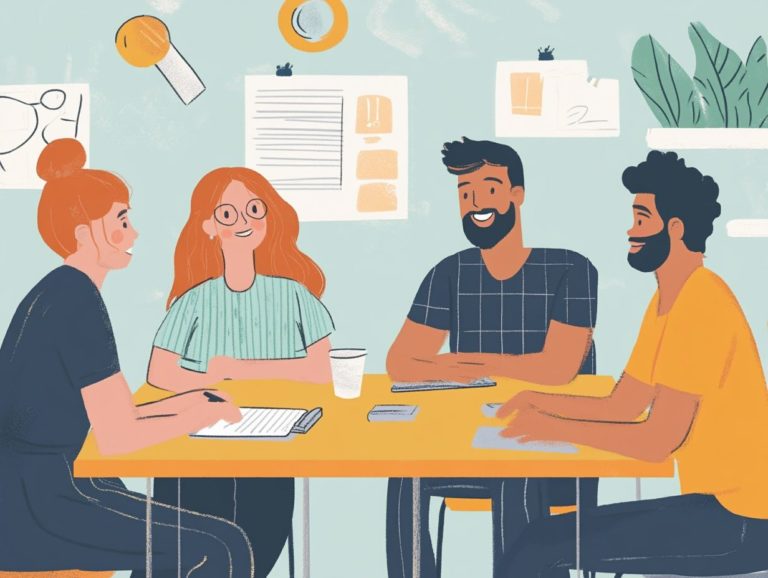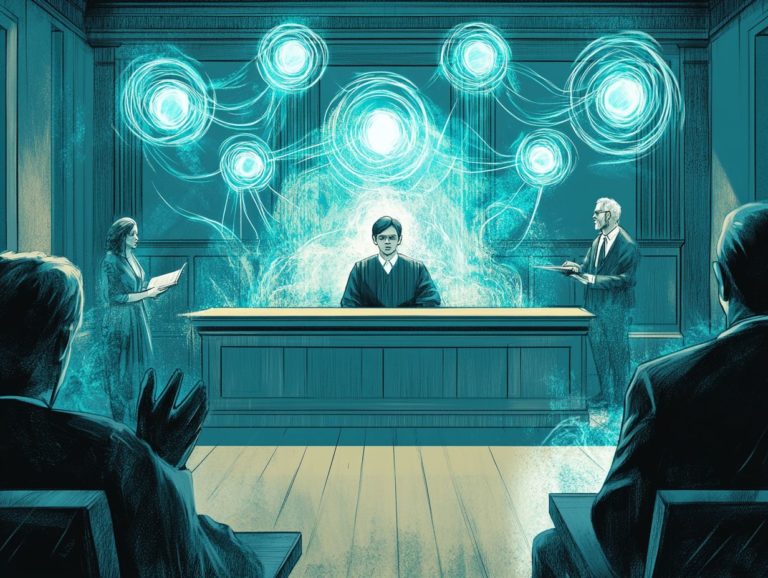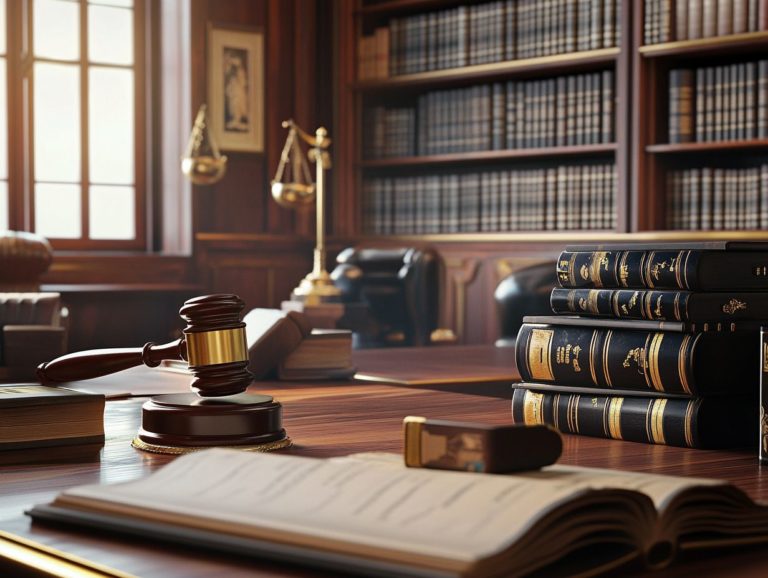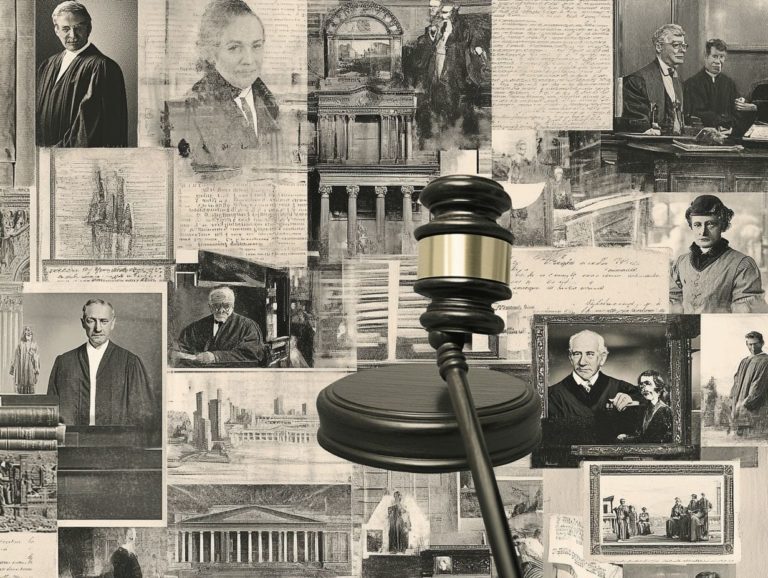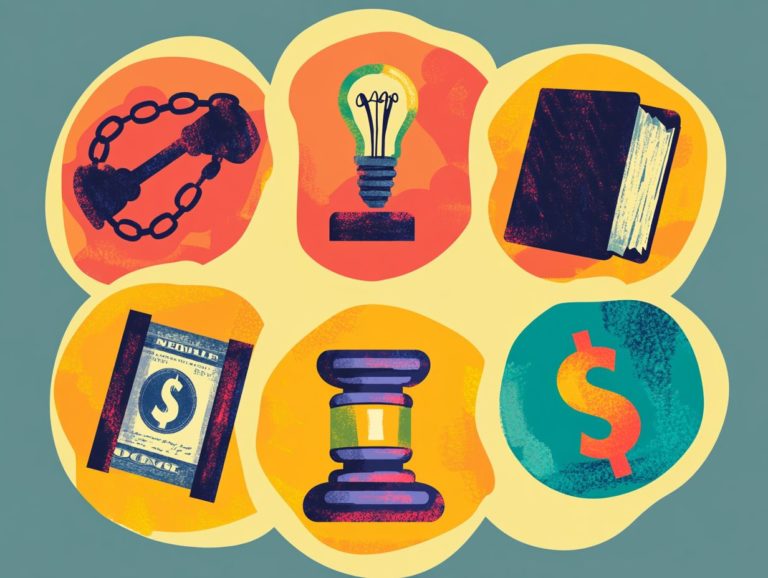5 Things You Didn’t Know About Copyright Law
Copyright law is frequently misunderstood, yet it serves a vital purpose in safeguarding the rights of creators across various mediums.
As an artist, writer, or content creator, understanding copyright can be your shield, protecting your work and guiding your choices. This article reveals five surprising facets of copyright law that extend beyond written works and delve into the complexities of fair use.
With insights into registration and the potential ramifications of infringement, you ll be excited and prepared to navigate this essential legal landscape. Immerse yourself in the knowledge that can empower and protect your creative pursuits.
Contents
- Key Takeaways:
- 1. Copyright Law Protects More Than Just Written Works
- 2. Fair Use is Not a Black and White Concept
- 3. Copyright Protection Lasts Longer Than You Think
- 4. You Can Register Your Copyright with the US Copyright Office
- 5. Copyright Infringement Can Result in Serious Consequences
- What Exactly Does Copyright Law Protect?
- What Is Considered Fair Use and How Does It Apply to Copyright Law?
- What Are the Different Types of Copyright Protection?
- How Can One Register Their Copyright?
- What Are the Potential Consequences of Copyright Infringement?
- How Can One Protect Themselves from Copyright Infringement?
- What Are the Common Myths Surrounding Copyright Law?
- Frequently Asked Questions
Key Takeaways:
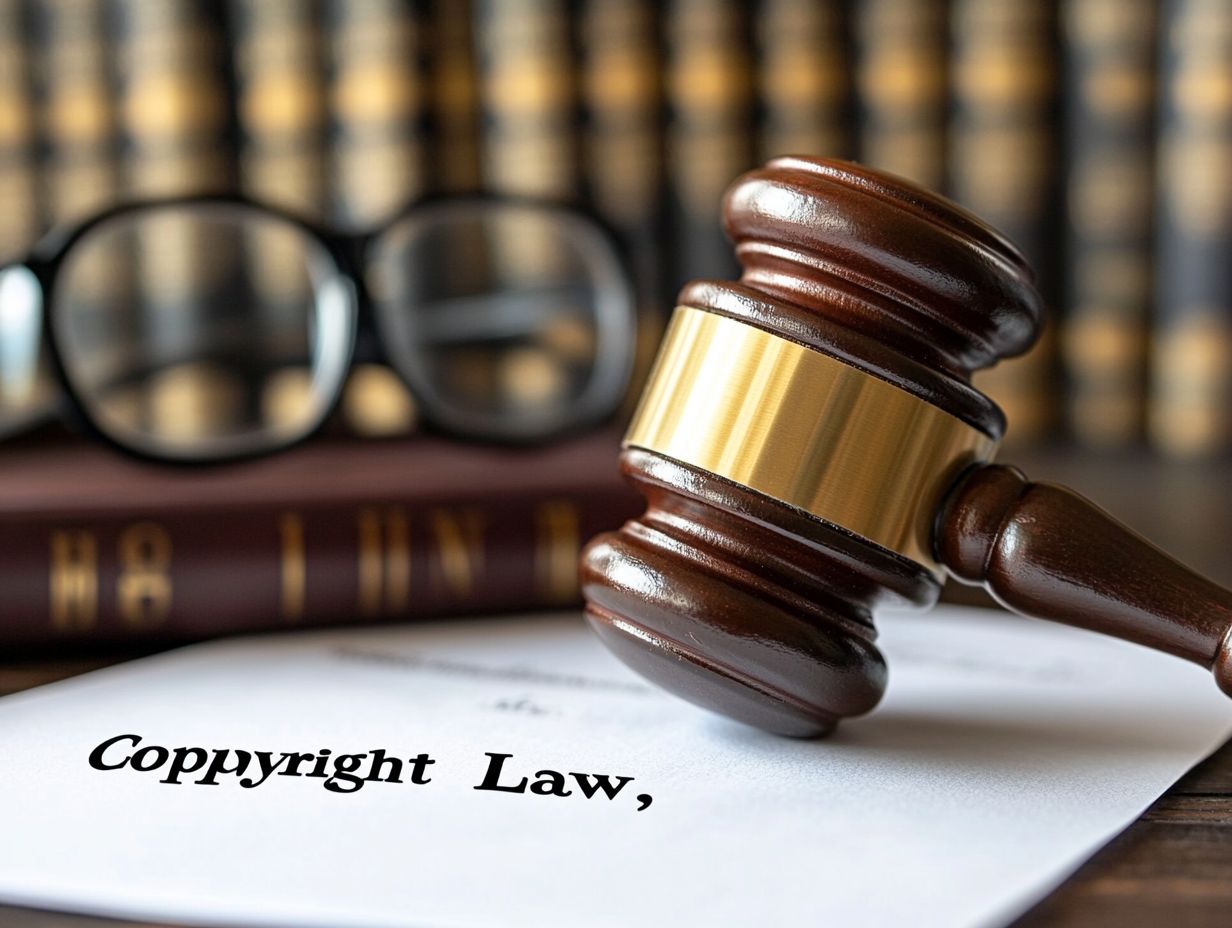
- Copyright protects music, art, and digital content, not just text!
- Fair use is a complicated rule that allows limited use of someone else’s work without permission, considering factors like purpose and amount used.
- Copyright protection can last for up to 70 years after the creator’s death.
1. Copyright Law Protects More Than Just Written Works
Copyright law plays a pivotal role in protecting your intellectual property. It covers sound recordings, visual art, and performance arts, enriching the cultural and economic fabric of the United States.
These protections ensure that your artistic expressions whether music compositions, films, or unique visual art are recognized and safeguarded by law. For authors, this means exclusive rights over your works, giving you control over reproductions, distributions, and performances.
If you re a foreign author, you benefit from international agreements like the Berne Convention. These guidelines promote copyright protection among member countries, fostering a more interconnected global market for creative works. Both domestic and international creators can feel secure knowing their contributions are protected, fueling innovation and artistic exploration.
2. Fair Use is Not a Black and White Concept
Fair use is a complicated rule within copyright law that allows limited use of copyrighted material without prior permission. It s often relevant in contexts such as education, critique, and transformative content creation.
This principle appears in many situations. For example, when you incorporate quotes in academic papers or provide commentary on social issues by reinterpreting existing artwork.
Imagine a documentary that uses clips from a film for critical analysis; that illustrates transformative use. Courts typically evaluate factors like the purpose and character of the use distinguishing between commercial and educational motives along with the nature of the copyrighted work, the amount utilized, and the impact on the market for the original piece.
In this way, fair use balances creators’ rights with the public’s interest in accessing and engaging with creative works.
3. Copyright Protection Lasts Longer Than You Think
The duration of copyright protection can extend well beyond your lifetime, often lasting for decades. Specific terms in the Copyright Act dictate when your works will enter the public domain.
For many creations, like literary and artistic works, copyright remains in effect for 70 years after your death. This provides a robust shield against unauthorized use. However, if your work is created under corporate authorship, the rules shift slightly: it typically lasts for 95 years from publication or 120 years from creation, whichever is shorter.
This framework underscores the importance of registration in safeguarding your rights and streamlining enforcement. Once those terms expire, your works transition into the public domain, allowing anyone to use and adapt them freely, fostering creativity and innovation within the artistic community.
To learn more about copyright law and consider your own creative rights, continue exploring this vital topic!
4. You Can Register Your Copyright with the US Copyright Office
Registering your copyright with the US Copyright Office is essential for protecting your creative works. This registration not only proves your authorship but also grants you key legal advantages for a modest fee.
Start by completing the application form, which you can submit online or by mail. Gather the required samples of your work and prepare a clear copyright notice.
Once your documents are ready, submit the registration fee, which varies depending on the type of work.
After successful registration, you gain enhanced rights. This includes the ability to pursue damages and attorney fees in case someone infringes on your copyright.
5. Copyright Infringement Can Result in Serious Consequences
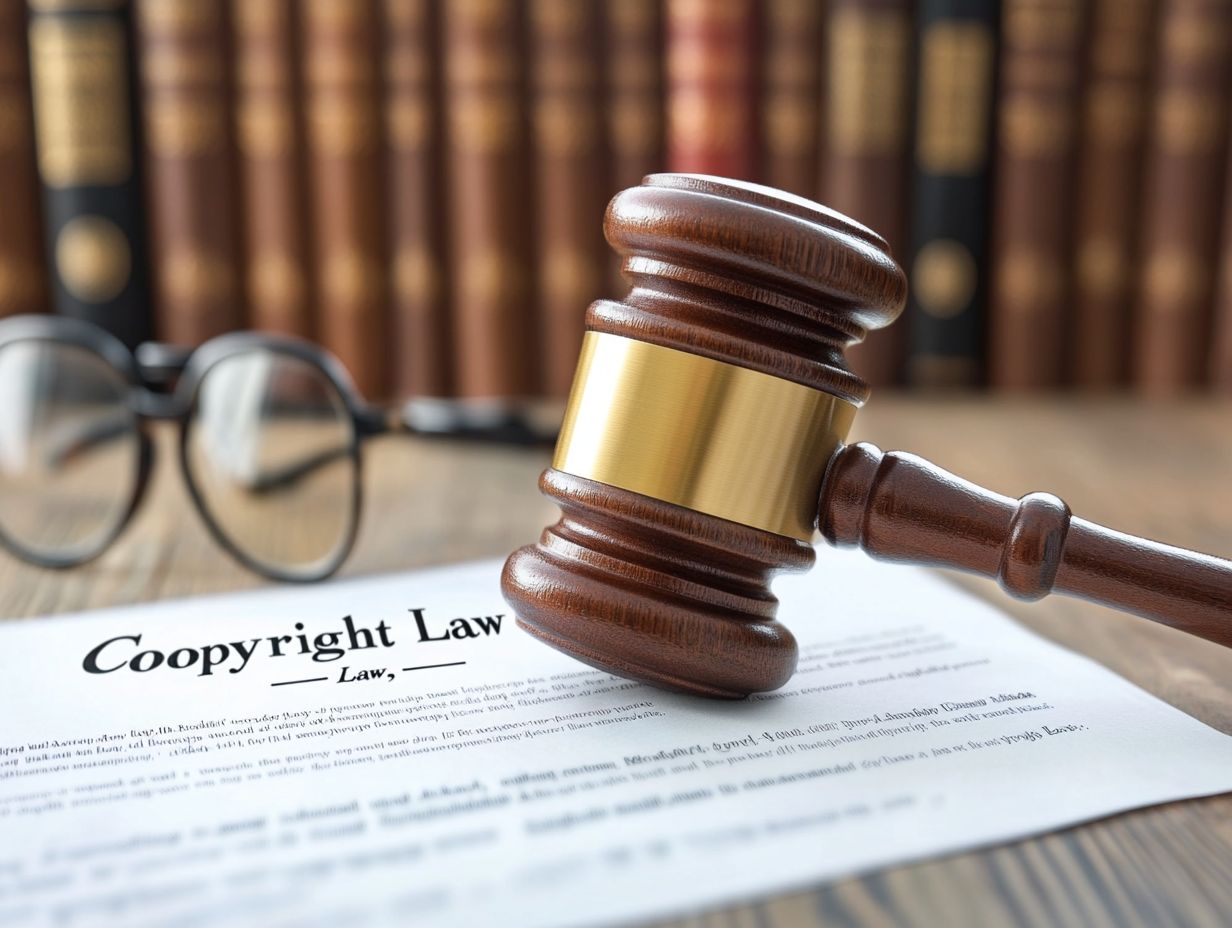
Copyright infringement can lead to serious issues, including lawsuits and financial penalties. Understanding and respecting copyright laws is crucial.
If you use copyrighted material without permission, you risk hefty fines and legal actions from copyright holders. These legal battles can be draining, both emotionally and financially.
The U.S. Copyright Office helps creators protect their works and navigate disputes effectively.
By understanding copyright law, you can better protect your creations and promote a culture of respect for intellectual property.
What Exactly Does Copyright Law Protect?
Copyright law protects a wide range of creative works, ensuring you retain ownership of your creations. This law safeguards original works of authorship, sound recordings, and derivative creations.
Your novels, poems, and essays are well-protected, as are your musical compositions and recordings. Visual arts like paintings, sculptures, and photographs also enjoy these protections.
In our digital world, software protection is critical, allowing programmers to maintain ownership of their code. Original works are vital as they enrich our culture and drive innovation.
Derivative works, such as adaptations and remixes, are also protected as long as they are original. This reflects the relationship between inspiration and creativity.
What Is Considered Fair Use and How Does It Apply to Copyright Law?
Fair use allows limited use of copyrighted material without permission from the copyright holder. This is particularly relevant in criticism, news reporting, teaching, and research.
It balances copyright protection with the need for innovation and discussion. For example, a movie reviewer can use clips to enhance their critique, providing valuable context for the audience.
There are four key factors in fair use:
- The purpose and character of the use
- The nature of the copyrighted work
- The amount used
- The effect on market value
These factors help determine whether your use is justified. Transformative use is especially important; if your work adds something new or changes the original meaning, courts may recognize it as fair use.
This approach fosters a lively exchange of ideas while still honoring copyright principles.
What Are the Different Types of Copyright Protection?
Copyright protection covers various creative works. This includes original works and adaptations, ensuring that creators’ rights are respected.
This legal framework applies to novels, music, visual art, and even architectural designs.
Derivative works, which adapt existing creations, play a crucial role in innovation. They help maintain the value of original works, ensuring creators get recognized and rewarded.
Copyright law balances the interests of creators with the public, fostering a vibrant artistic landscape.
How Can One Register Their Copyright?
To register your copyright, you must submit an application to the US Copyright Office. This includes filling out a registration form, providing a copyright notice, and paying a fee to establish your ownership.
This step is essential for protecting your creative works. Start by downloading the correct registration form from the Copyright Office’s website and fill it out accurately.
Gather supporting documentation, like drafts or recordings. When creating your copyright notice, use the symbol, followed by the date and your name. Then, submit everything online or by mail.
Proper notice formatting is critical, as it publicly declares your ownership.
What Are the Potential Consequences of Copyright Infringement?
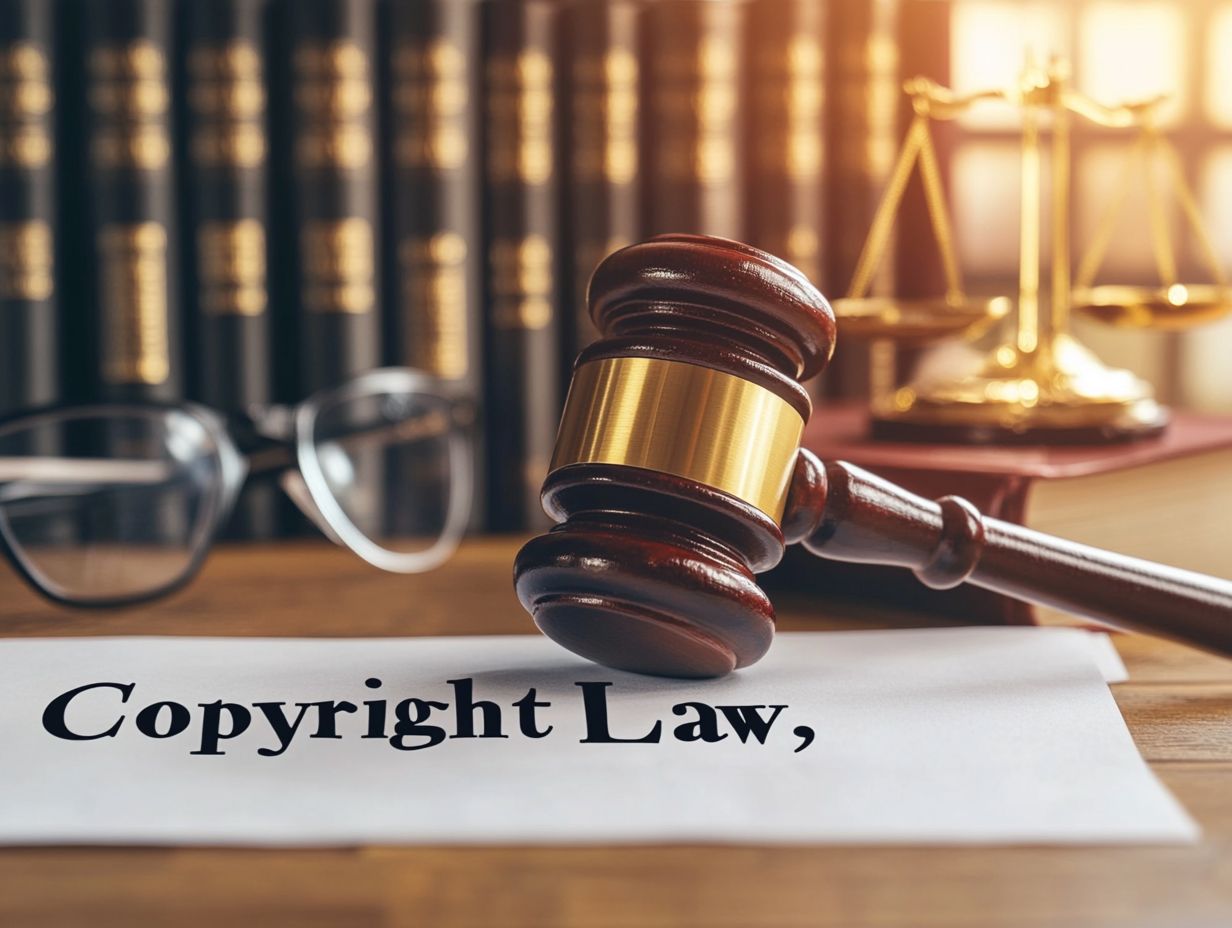
The consequences of copyright infringement can be severe. You may face monetary damages, penalties, and lawsuits that disrupt your operations.
Legal repercussions vary based on the violation’s severity. For example, the Recording Industry Association of America (RIAA) has pursued individuals sharing music illegally, leading to fines over tens of thousands of dollars.
Even smaller cases can lead to costly settlements. Understanding copyright laws is crucial to avoid these risks.
How Can One Protect Themselves from Copyright Infringement?
To protect yourself from copyright infringement, use copyright notices, register your works, and learn your rights. These steps are fundamental for safeguarding your creations.
Regularly monitor your work across platforms to catch unauthorized use. With a proactive approach, you can quickly address violations by sending cease-and-desist letters or taking legal action.
Having clear contracts ensures your rights are defined when collaborating, reducing the risk of misunderstandings. Stay updated on copyright law changes to defend your work effectively.
What Are the Common Myths Surrounding Copyright Law?
Let’s dive into the myths that could lead you astray and learn how to protect your creative rights! There are countless myths surrounding copyright law that can create confusion about what is legally permissible. To safeguard your work effectively, consider these 5 tips for protecting your copyrighted work, as this often results in unintentional copyright infringement regarding intellectual property rights.
You might think that simply crediting the original creator shields you from any legal troubles. Alternatively, you may believe that all online content is up for grabs without permission.
However, copyright protections begin automatically the moment an original work is created and fixed in a tangible form. This includes everything from music and text to images.
These misunderstandings pose significant challenges for both professional and amateur content creators. By understanding these misconceptions, you can navigate the intricate landscape of copyright law more effectively and learn about trademarks to protect your own creative endeavors.
Frequently Asked Questions
What is copyright law?
Copyright refers to the legal right that creators have over their original works. Copyright law is a set of legal rules and regulations that protect original works of authorship, such as books, music, and artwork, from being copied or used without the permission of the creator.
What are the benefits of copyright law?
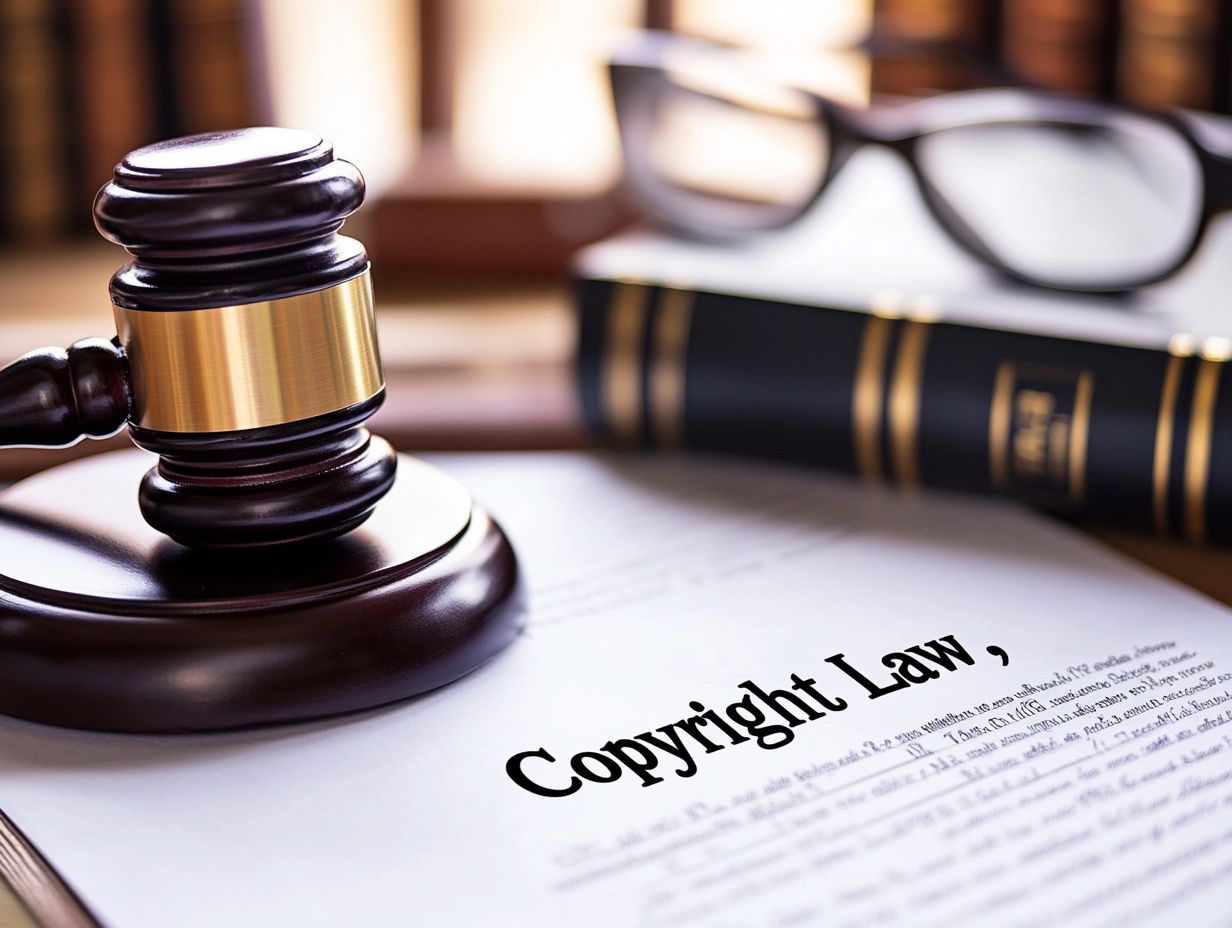
Copyright law allows creators to control how their work is used and distributed. It also enables them to profit from their creations. Additionally, it encourages creativity and innovation by providing legal protection for original works.
What constitutes a copyright violation?
A copyright violation occurs when someone uses, copies, or distributes original work without the permission of the copyright owner. This can include using a portion of a work without proper attribution or using a work for commercial purposes without permission. It can also involve creating a derivative work without authorization.
What are the consequences of violating copyright law?
The consequences of violating copyright law can vary. Typically, they include legal action, such as a lawsuit, and monetary penalties. Ignoring copyright laws can lead to serious consequences protect yourself now!
Are there any exceptions to copyright law?
Yes, there are certain exceptions to copyright law, such as fair use. Fair use allows for the limited use of copyrighted material for purposes such as criticism, comment, news reporting, teaching, scholarship, or research. However, the specific guidelines for fair use can be complex and are not always clear-cut.
How long does copyright protection last?
The length of copyright protection can vary depending on the type of work. For works created after January 1, 1978, copyright protection lasts for the life of the author plus 70 years after their death. For works created before 1978, the copyright term can vary and should be researched on a case-by-case basis.

